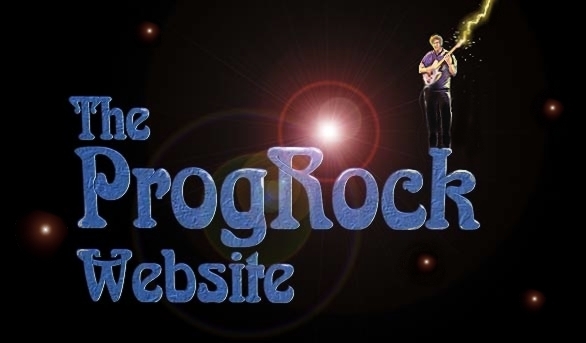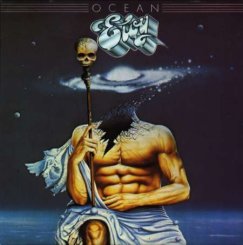Eloy is a German progressive rock band with some space rock added in for good measure. The group's names originates from H.G. Wells- "The Time Machine" and pertains to a human race 800,000 years in the future.
 In the late 60's bands in Germany were usually cover bands with only a few that created their own original compositions.
In the late 60's bands in Germany were usually cover bands with only a few that created their own original compositions.
 In the beginning, the band consisted of lead singer Erich Schriever, guitar and keyboard player Manfred Wieczorke, and guitarist/vocalist Frank Bornemann. All the musicians were composers.
In the beginning, the band consisted of lead singer Erich Schriever, guitar and keyboard player Manfred Wieczorke, and guitarist/vocalist Frank Bornemann. All the musicians were composers.
 Inspired by bands like The Shadows and later The Beatles, the then school band would cover songs by The Beatles, The Moody Blues, The Who and Cream until the following year in 1970, they started to pen their own material. A single "Daybreak" (b-side- Walk alone) was released the same year.
Inspired by bands like The Shadows and later The Beatles, the then school band would cover songs by The Beatles, The Moody Blues, The Who and Cream until the following year in 1970, they started to pen their own material. A single "Daybreak" (b-side- Walk alone) was released the same year.
 In 1971, Eloy first LP (self-titled) was recorded and released. Frank Bornemann states- "From the beginning, we tried to find a very special style, influenced by progressive rock music. Of course, it took time to find an individual identity." Helmut Draht as replaced by drummer Fritz Randow.
In 1971, Eloy first LP (self-titled) was recorded and released. Frank Bornemann states- "From the beginning, we tried to find a very special style, influenced by progressive rock music. Of course, it took time to find an individual identity." Helmut Draht as replaced by drummer Fritz Randow.
 EMI signed the band in 1972, and by the release of `Inside,' everyone in the band knew that they would take the progressive road as their musical style.
EMI signed the band in 1972, and by the release of `Inside,' everyone in the band knew that they would take the progressive road as their musical style.
A tour followed as Eloy opened up for English acts- Beggars Opera and East of Eden. The song "Future city" reached the Top Ten of some American radio-stations.
 In 1973, Wolfgang Stöcker left the band. Luitjen Janssen replaced him and the next year, "Floating" was released.
In 1973, Wolfgang Stöcker left the band. Luitjen Janssen replaced him and the next year, "Floating" was released.
In 1975, `Power And The Passion,' was released with a second guitarist Detlev Schwaar. It reached sales figures of 30,000. But by the end of the year, the Eloy broke up because of musical differences. Bornemann wanted to continue the concept-albums and a mixture of symphonic arrangements, atmospheres and rock structures. Manfred Wieczorke did not agree and left to the group- Jane. Aside from these differences, Eloy where not on solid ground financially and had `trouble' with their manager- Jay Partridge.
 In 1976, Bornemann had to reform the band totally with musicians from his my hometown: Klaus-Peter Matziol (bass/vocals), Jürgen Rosenthal (drums/lyricist), Detlev Schmidtchen (moved from the guitar to the keyboards).
In 1976, Bornemann had to reform the band totally with musicians from his my hometown: Klaus-Peter Matziol (bass/vocals), Jürgen Rosenthal (drums/lyricist), Detlev Schmidtchen (moved from the guitar to the keyboards).  With this line-up, Eloy became the most successful rock band in Germany. They released- `Dawn,' which sold 150,000 copies, the financial situation was improving, which gave Eloy more opportunity to increase the budget on their recordings.
With this line-up, Eloy became the most successful rock band in Germany. They released- `Dawn,' which sold 150,000 copies, the financial situation was improving, which gave Eloy more opportunity to increase the budget on their recordings.
 `Ocean,' arguably their finest album was released in 1977 and sold more than 200,000 copies (Doing better than Genesis or Queen on the German charts). The album's concept revolves around the history of Atlantis, its creation, its 'metaphysical' existence, degradation, decline and downfall. From the `Ocean' tour, they released a double live album- `Eloy Live,' in 1978. They followed up with `Silent Cries and Mighty Echoes,' the year later to even greater success.
`Ocean,' arguably their finest album was released in 1977 and sold more than 200,000 copies (Doing better than Genesis or Queen on the German charts). The album's concept revolves around the history of Atlantis, its creation, its 'metaphysical' existence, degradation, decline and downfall. From the `Ocean' tour, they released a double live album- `Eloy Live,' in 1978. They followed up with `Silent Cries and Mighty Echoes,' the year later to even greater success.
 Jim McGillveray replaced Jürgen Rosenthal on drums 1978, as well as Hannes Arkona and Hannes Folberth were added to the band's line-up after Detlev Schmidtchen left was well.
Jim McGillveray replaced Jürgen Rosenthal on drums 1978, as well as Hannes Arkona and Hannes Folberth were added to the band's line-up after Detlev Schmidtchen left was well.
 In spring 1980, Eloy released `Colours.' Disagreements over their evolving style occurred frequently. Bornemann wanted to continue in the old style of the band, albeit with a few modern up-dates, while other members wanted to venture into hard rock territory. Bornemann won.
In spring 1980, Eloy released `Colours.' Disagreements over their evolving style occurred frequently. Bornemann wanted to continue in the old style of the band, albeit with a few modern up-dates, while other members wanted to venture into hard rock territory. Bornemann won.
 `Planets,' (released in 1981), was part one of a two-part science-fiction concept album. It's sequel- 1982's `Time to Turn,' was released as part II.
`Planets,' (released in 1981), was part one of a two-part science-fiction concept album. It's sequel- 1982's `Time to Turn,' was released as part II.  `Performance,' released in 1983 was followed by a tour of German-speaking countries and the UK.
`Performance,' released in 1983 was followed by a tour of German-speaking countries and the UK.
After completing `Metromania,' in 1984, the band, with was being pulled by individuality instead of a group effrt, announced another breakup. Eloy gave several farewell concerts in the UK, which were recorded by the BBC.
Bornemann did revive the band until years later, using all the new technologies to record drum machine tracks and other sound layers.
 In 1988 `Ra,' was released by the new company SPV and introduced at a live-TV-show. 1992 brought a released called- `Destination,' with Klaus-Peter Matziol returning play bass on several tracks.
In 1988 `Ra,' was released by the new company SPV and introduced at a live-TV-show. 1992 brought a released called- `Destination,' with Klaus-Peter Matziol returning play bass on several tracks.
Bornemann states- "As the other members of Eloy and I never had problems with each other during the long years we spent working together - we only had differing opinions regarding the music"
 During 1993-1994, the Eloy released three best of collections and it wasn't until 1994 with the release of `The Tides Return Forever,' that they recorded and toured again is released and the band reappeared live on stage for several successful shows in Germany. A throwback to classical Eloy, some call it the best Eloy album in 20 years. The touring line-up was: Frank Bornemann - Guitar and Vocals, Michael Gerlach - Keyboards, Klaus-Peter Matziol - Bass, Steve Mann - Guitars and Keyboards, Bodo Schopf - Drums and Bettina Lux and Susanne Schätzle - backing vocals/choir. Matziol is now once again a permanent member in Eloy.
During 1993-1994, the Eloy released three best of collections and it wasn't until 1994 with the release of `The Tides Return Forever,' that they recorded and toured again is released and the band reappeared live on stage for several successful shows in Germany. A throwback to classical Eloy, some call it the best Eloy album in 20 years. The touring line-up was: Frank Bornemann - Guitar and Vocals, Michael Gerlach - Keyboards, Klaus-Peter Matziol - Bass, Steve Mann - Guitars and Keyboards, Bodo Schopf - Drums and Bettina Lux and Susanne Schätzle - backing vocals/choir. Matziol is now once again a permanent member in Eloy.
 After another `Best of Eloy' release, the band created `Ocean 2;' released on October 12, 1998- a slick work that lyrically shows little similarity to the first `Ocean' album. German label "SPV" refused to release the album, thus Eloy utilized a small "metallic" label `GUN,' ("Great Unlimited Noises"), to distribute it.
After another `Best of Eloy' release, the band created `Ocean 2;' released on October 12, 1998- a slick work that lyrically shows little similarity to the first `Ocean' album. German label "SPV" refused to release the album, thus Eloy utilized a small "metallic" label `GUN,' ("Great Unlimited Noises"), to distribute it.
 Frank Bornemann has declared that Eloy will stop their stage-appearances forever. The band has permanently retired.
Frank Bornemann has declared that Eloy will stop their stage-appearances forever. The band has permanently retired.
In August 2009, it was announced that Eloy would be reforming for a new album. The support of fans from many parts of the world, which had been around for many years, eventually reached the ears of the musicians themselves. And so Frank Bornemann, lead singer, guitarist, and producer of Eloy reunited the band again for its 40th anniversary. After a break of eleven years, Eloy launched a new album with the title "Visionary", aiming to recapture the spirit of the early years.
A double DVD, 'The Legacy Box', was released in December 2010 and contains a number of videos and television recordings from all periods of the band, as well as a comprehensive documentary of the band's history with interviews, a photo gallery, and many other features.
The band played at festivals in Germany and Switzerland in July 2011 with largely the same personnel as those on the 1994-1995 tour.
Eloy cancelled their first-ever performance in North America. The band was supposed to headline the North East Art Rock Festival on Sunday, June 24, 2012. The cancellation was due to Frank Bornemann's injury following a road accident in March 2012.
Studio albums
Eloy (1971)
Inside (1973)
Floating (1974)
Power and the Passion (1975)
Dawn (1976)
Ocean (1977)
Silent Cries and Mighty Echoes (1979)
Colours (1980)
Planets (1981)
Time to Turn (1982)
Performance (1983)
Metromania (1984)
Code Name: Wild Geese (1984) (soundtrack)
Ra (1988)
Destination (1992)
The Tides Return Forever (1994)
Ocean 2: The Answer (1998)
Visionary (2009)
The Vision, the Sword and the Pyre – Part 1 (2017)[5]
Compilation / remix albums / box sets
Rarities (1991)
Chronicles I (1993)
Chronicles II (1994)
The Best of Eloy Vol.I - The Early Days 1972-1975 (1994)
The Best of Eloy Vol.II - The Prime 1976-1979 (1996)
Timeless Passages (2003)
The Legacy Box (2010)
Live albums
Live (1978)
Live Impressions (DVD, 2013)
Reincarnation on Stage (2014, CD and DVD)


